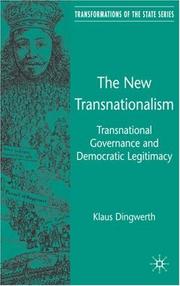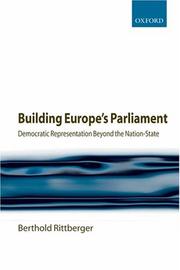| Listing 1 - 10 of 55 | << page >> |
Sort by
|

ISBN: 0312235240 Year: 2000 Publisher: Houndmills London Macmillan
Abstract | Keywords | Export | Availability | Bookmark
 Loading...
Loading...Choose an application
- Reference Manager
- EndNote
- RefWorks (Direct export to RefWorks)
Book
ISBN: 1003006078 1000028372 1003006078 Year: 2020 Publisher: Abingdon, Oxon ; New York, NY : Routledge,
Abstract | Keywords | Export | Availability | Bookmark
 Loading...
Loading...Choose an application
- Reference Manager
- EndNote
- RefWorks (Direct export to RefWorks)
"This book develops a constitutional theory of international organization to explain the legitimation supranational organizations. Supranational organizations play a key role in contemporary global governance, but recent events like Brexit and the threat by South Africa to withdraw from the International Criminal Court suggest that their legitimacy continues to generate contentious debates in many countries. Rethinking international organization as a constitutional problem, Oates argues that it is the representation of the constituent power of a constitutional order, that is, the collective subject in whose name authority is wielded, which explains the legitimation of supranational authority. Comparing the cases of the European Union, the World Trade Organization, and the International Criminal Court, Oates shows that the constitution of supranationalism is far from a functional response to the pressures of interdependence but a value-laden struggle to define the proper subject of global governance"--
Book
ISBN: 378907103X Year: 2001 Publisher: Baden-Baden Nomos
Abstract | Keywords | Export | Availability | Bookmark
 Loading...
Loading...Choose an application
- Reference Manager
- EndNote
- RefWorks (Direct export to RefWorks)
International cooperation. --- International organization. --- Supranationalism.
Book
ISBN: 131723586X 1317235851 1315626713 Year: 2018 Publisher: Milton : Routledge,
Abstract | Keywords | Export | Availability | Bookmark
 Loading...
Loading...Choose an application
- Reference Manager
- EndNote
- RefWorks (Direct export to RefWorks)
With the ending of the Cold War and the rise of a nationalistic 'America First' strategy, the post-war liberal international order, based upon the hegemonic power of the USA, is fading away. In its place, a multipolar world is emerging which, while offering some the hope of a better future, is also open to disorder and instability. This book offers an insight into the relationship between politics and economics in this new era. As an alternative, this volume argues for a form of global governance that will offer a better balance between politics and economics, based on a supranational approach. A supranational approach in which world powers and UN member states can work in agreement would follow the principle on which European political and economic integration was built. The system put forward here is based on a Keynesian world clearing union and a reform of the World Trade Organization and a United Nations budget, which would accelerate the convergence of rich and poor countries in the aim of a more sustainable global system. This book demonstrates that globalisations and today's ecological challenges are both a cause of social discontent and an opportunity. Supranational institutions can greatly increase our ability to address global risks, and this book shows how a 'supranational' world order could reduce the uncertainty of the transition from the post-war order to the future multipolar order.The supranational principle enables us to view globalisation, world capitalism and the ecological crisis not only as causes of inequality, poverty and social instability, but also as processes that can be governed. Wise politicians and political parties cannot let the future of humanity be decided by the precarious equilibrium of the Westphalia system. In post-war Europe a group of nation states, once fierce enemies, embarked on a process of integration which led to the abolition of inter-European national borders. With supranational global governance, the same could be achieved in the global system.
International economic relations. --- Supranationalism. --- Globalization.

ISBN: 9780230545274 0230545270 1349360805 9786611780371 1281780375 0230590144 Year: 2007 Publisher: Basingstoke Palgrave Macmillan
Abstract | Keywords | Export | Availability | Bookmark
 Loading...
Loading...Choose an application
- Reference Manager
- EndNote
- RefWorks (Direct export to RefWorks)
Global rules are increasingly made without the direct involvement of states. This book explores what this privatisation of global rule-making means for democracy. Based on contemporary theoretical approaches to democratic global governance, it reconstructs three prominent rule-making processes in the field of global sustainability politics: the World Commission on Dams, the Global Reporting Initiative and the Forest Stewardship Council. The book argues that, if designed properly, private transnational rule-making can be as democratic as intergovernmental rule-making.
Democracy. --- International cooperation. --- International organization. --- Supranationalism.
Book
ISBN: 9780199641246 0199641242 Year: 2012 Publisher: Oxford Oxford University Press
Abstract | Keywords | Export | Availability | Bookmark
 Loading...
Loading...Choose an application
- Reference Manager
- EndNote
- RefWorks (Direct export to RefWorks)
"The debate on the EU's legitimacy has long suffered from a number of serious misunderstandings. Supranational politics, Jurgen Neyer argues, is not about the making of public order in Europe but about internalizing external effects and fostering the individual right to justification. The concepts of 'state' and 'democracy', he suggests, are essentially useless for understanding and justifying the EU's structures and practices. The European Union is a dualistic polity that is not replacing but supplementing its member states. Its modus of operation is the joint exercise of pooled competencies on the normative basis of the principle of mutual recognition. He goes on to show that the EU provides an important cure to many of the problems that modern democracies are facing in a globalizing world. Legal integration internalizes external effects and democratizes democracies by transforming strategic international bargaining into a justificatory transnational discourse. The EU promotes the cause of justice by providing an effective remedy to horizontal and vertical power asymmetries, and to the arbitrariness of untamed anarchy. The EU is far from perfect, however. European politics is still deeply embedded in a culture of integration by stealth and closely connected to a deep mistrust in the capacity of ordinary citizens to understand politics. A major change in the constitutional set up of the EU is required. It should build on a new understanding of the EU's institutions as catering to the individual right to justification and give national parliaments a strategic role in further developing its constitutional design."--Publisher's website.
Political sociology --- European Union --- Supranationalism --- Supranationalité --- European Union. --- Supranationalité --- Supranationalism - Europe
Book
ISBN: 9782840504702 2840504707 Year: 2006 Volume: 5 Publisher: Paris : PUPS. Presses de l'université Paris-Sorbonne,
Abstract | Keywords | Export | Availability | Bookmark
 Loading...
Loading...Choose an application
- Reference Manager
- EndNote
- RefWorks (Direct export to RefWorks)
Sovereignty --- Supranationalism --- Souveraineté --- Supranationalité --- Souveraineté --- Supranationalité --- Political philosophy

ISBN: 0199231990 1281198404 9786611198404 0191534269 1435622812 Year: 2005 Publisher: Oxford ; New York : Oxford University Press,
Abstract | Keywords | Export | Availability | Bookmark
 Loading...
Loading...Choose an application
- Reference Manager
- EndNote
- RefWorks (Direct export to RefWorks)
Why have the national governments of EU member states successively endowed the European Parliament with supervisory, budgetary, and legislative powers over the past fifty years? Building Europe's Parliament sheds new light on this pivotal issue, and provides a major contribution to the study of the European Parliament. Rittberger develops a theory of delegation to representative institutions in international politics which combines elements of democratic theory and different strands of institutionalist theory. To test the plausibility of his theory, Rittberger draws on extensive archival mater
Supranationalism --- Legislative power --- European Parliament. --- World politics --- European Communities. Parliament
Book
Year: 2010 Publisher: Copenhagen : Nordic Council of Ministers,
Abstract | Keywords | Export | Availability | Bookmark
 Loading...
Loading...Choose an application
- Reference Manager
- EndNote
- RefWorks (Direct export to RefWorks)
Supranationalism --- Nordic Council of Ministers. --- Scandinavia --- Politics and government
Book
ISBN: 0191979937 0192883763 0192883755 9780192883766 9780192883742 Year: 2023 Publisher: Oxford Oxford University Press
Abstract | Keywords | Export | Availability | Bookmark
 Loading...
Loading...Choose an application
- Reference Manager
- EndNote
- RefWorks (Direct export to RefWorks)
The United Kingdom has been weakening, and this book helps to explain why. Alvin Jackson examines the UK in the light of the experience of similar union states elsewhere, offering the first sustained comparative study across the long 19th century and beyond. The UK was not in fact the only self-styled 'united kingdom' of the time: Jackson argues strikingly that Britain exported the idea of union through the advocacy or encouragement of other multinational unitedkingdoms at the beginning of the 19th century.The work is distinctive in its geographical breadth. Jackson draws together the histories of Ireland, Scotland, Wales, and England and explores the links between them and Sweden-Norway, the united Netherlands, Austria-Hungary, and Canada--and many other polities across the globe. United Kingdoms looks too at the institutions and agencies affecting the strength of union--from monarchy, aristocracy, and religion through to class, money, and violence. Jackson offers newoverarching arguments about the origins and survival of all union states, and in doing so, sheds new light on the particular history and condition of the UK.
Multinational states --- Supranationalism --- History --- Great Britain --- Politics and government.
| Listing 1 - 10 of 55 | << page >> |
Sort by
|

 Search
Search Feedback
Feedback About UniCat
About UniCat  Help
Help News
News